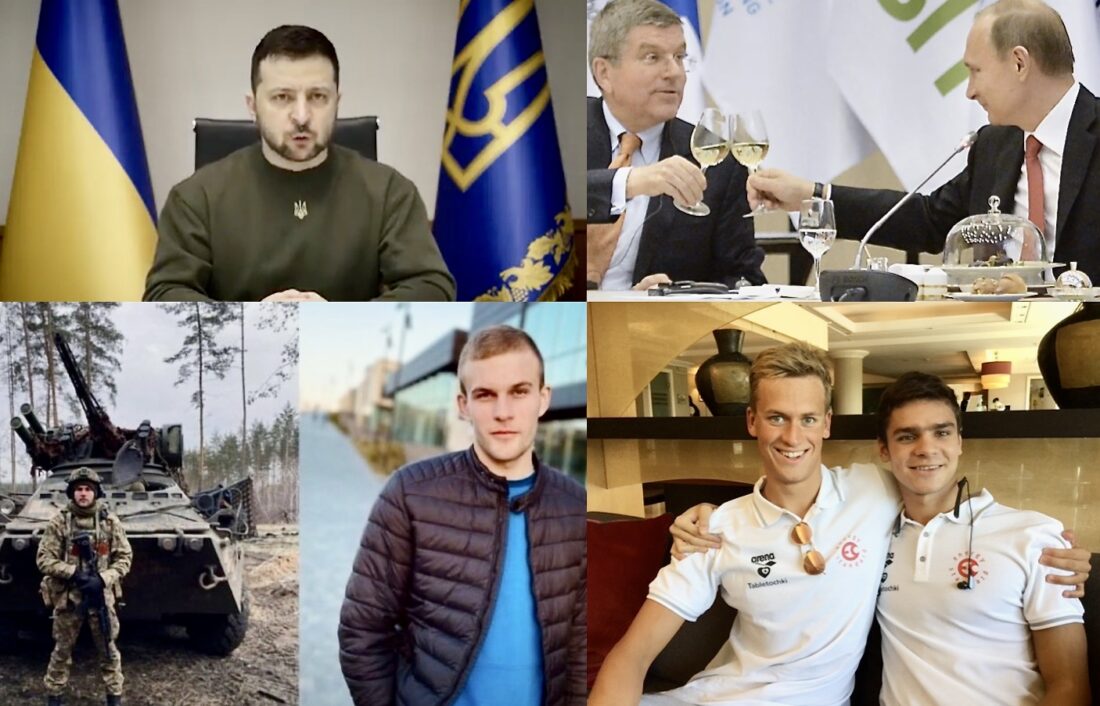World Aquatics Establishes Task Force To Consider Way Back For Russians (In War, There Isn’t One!)

World Aquatics has established a task force to consider a way back to competition for Russian and Belarusian athletes who have been locked out of the majority of Olympic sport because of their nations’ illegal war on Ukraine.
The working group will report back at the next Bureau (board) meeting on the cusp of World Championships in Fukuoka this July. Meanwhile, the current ban on athletes from the aggressor nations remains in force. There will be no Russians or Belarusians in Japan.
“The World Aquatics Bureau’s decision to not invite athletes and officials from Russia and Belarus to World Aquatics events remains in effect today”, the global regulator noted in a statement (in full below) in which it reaffirmed its “steadfast commitment to Ukrainian Athletes”.
The move by WA leaders follows a widely condemned stance at the International Olympic Committee (IOC): essentially, neutrality IOC-style means that Ukrainians have to accept that Russians and Belarusians have a right to compete alongside them. Ukraine, with the backing of more than 30 key Olympic nations, has said that it will boycott the Paris 2024 Olympic Games if athletes from the aggressor nations are allowed to compete.
The IOC’s suggested pathway is not unlike that followed at the height of the Russian doping crisis: FINA, then led by Putin fan and friend Julio Maglione, of Uruguay, as president and Cornel Marculescu, the long-time director from Romania, was among federations that followed rulings and guidance that resulted in swimmers with a doping record, including one with two suspensions to her name, being allowed back in the fray. The decision led to unprecedented and loud booing and jeering from the athlete, team and spectator stands when Russians and others with doping records walked out to compete in Brazil.
Comment – The continuation of a ban on Russians and Belarusians and the “steadfast commitment” to Ukrainian athletes by World Aquatics have strong backing in the worldwide swimming community.
Like the IOC, World Aquatics does not need a task force to tell it what it ought already to know: until Russia withdraws all military activities and personnel from Ukraine and agrees reparations in a peace deal negotiated by international arbiters, there is no case for asking Ukrainian athletes to compete in lanes, bouts, boats, boards and any other battle in sport alongside athletes from nations that have murdered and maimed their families, friends, fellow citizens of a sovereign nation and destroyed vast swathes of infrastructure in an illegal war.
The eyes of the world will now be on the task force that World Aquatics has established. It must represent the stakeholders of aquatic sports, not the IOC and not any leaders in any sport who show the smallest tendency to put the politics and the influence of the IOC above the interests and welfare of athletes.
And when we say athletes in this context, the circumstances of Ukrainian athletes must take priority over those of Russia and Belarusian athletes, who, sadly, find themselves in a situation where they must feel able to go home and tell their political rulers “we are isolated because of you and your illegal war, not because the rest of the world is wrong”.
At all times, any task force and leadership in aquatics should keep in mind the experience and thoughts of Mykhailo Romanchuk. His words must be the watchwords they heed before any consideration of athletes from Russia and Belarus in prevailing circumstances.
It is as simple as that. It is the only answer any task force worth its salt could possibly contemplate. All sport, including Olympic sport, takes part in this world, a world where the economy has been blasted by the woeful decisions of former IOC and FINA favourite Putin and his Kremlin cronies. The state of the economy affects investment in sport and has affected athletes, coaches, clubs, coverage and much else in aquatics sport. This past week, I’ve seen comments on social media from leading swimming across the world asking why there is little and even no mainstream media coverage of their sport as trials and championships season unfolds around the world.
At the surface, the answer is simple enough, even if the depths of the following explanation are what World Aquatics and all domestic federations need much deeper understanding on: there is no swimming season and no swimming media economy and budgetary commitment to consistent coverage of the biggest of the aquatic sports.
The truth is that the World Championships this summer, just one year out from the Olympic Games, may well unfold with a relative sprinkling of journalists covering the event from Fukuoka – a picture that is set to include an absence of mainstream media from a disturbing list of leading swimming nations. Beyond the press, key broadcasters have already taken the decision top bypass paying for rights and having a crew in town. Rather, they will cover the event remotely off a championship feed and confine the event largely to on-demand service streams.
The reasons need to be acknowledged, understood and acted upon. There’s a worthwhile task force right there.
Swimming is a top-tier (in the top three funded sports) Olympic sport but it is also a highly subsidised sport that lacks a mature market place and has not found the right formula for growing beyond its traditional fan base and the professionals and families who work in and participate in the sport at the elite level.
Allowing Russians and Belarusians back in at a time of war and any time shy of peace and reparations will not help any efforts to grow the swimming audience where such growth would have the biggest impact.
While World Aquatics cannot take responsibility for solving all of that, its leaders ought to be – and I do assume they are – smart enough to recognise the realities of the world and how those impact its stakeholders and the sports it governs.
Nothing would make Putin’s sporting day that hearing that the IOC et al have let his pawns back in the chess game he has long made of Olympic sport.
In dire circumstances and extreme situations, no autonomous bubble can claim not to be a part of the world and its politics. That includes Olympic sport and an IOC that likes to cite “neutrality” but misinterprets the word every time it uses it. Here’s the only interpretation they need to understand:

“If you are neutral in situations of injustice, you have chosen the side of the oppressor. If an elephant has its foot on the tail of a mouse and you say that you are neutral, the mouse will not appreciate your neutrality.”
Desmond Tutu – image: the elephant in the room with its foot on the tail of a mouse … photo by Craig Lord, courtesy of “The Mystery of Banksy”, a celebration of the work of the British street artist
More reading: Why Bach Should Answer Zelenskyy’s Call To Visit Bombed-Out Bakhmut & Bury IOC Fake Neutrality
The World Aquatics Statement On Russia & Belarus in full
LAUSANNE – The World Aquatics Bureau met today and gave its support to the statement made by the IOC Executive Board on 28 March 2023 regarding the potential future participation of athletes from Russia and Belarus in international competitions.
This statement followed the request from the majority of the Olympic movement stakeholders to the IOC to explore the potential return of athletes from Russia and Belarus to international sports events, based on the principles of the Olympic Charter.
The World Aquatics Bureau approved the establishment of a task force to explore a potential pathway for athletes with a Russian or Belarusian passport to participate in future international aquatics events as individual neutral athletes.
The task force, made up of athletes and representatives from across the aquatics community and chaired by Maureen Croes, the President of Panam Aquatics, will begin work immediately on developing a recommendation to the World Aquatics Bureau.
The World Aquatics Bureau notes that the task force will need to take time to come to its conclusions, and will report back at the next Bureau meeting in July 2023.
Previous World Aquatics Bureau Decisions on the Non-Invitation of Russian and Belarusian Athletes and Officials at World Aquatics Events
Following Russia’s invasion of Ukraine, the World Aquatics Bureau approved key measures to protect World Aquatics events and athlete welfare. These included the Bureau passing a new bylaw on 8 March 2022 that gave World Aquatics the power to review the participation of athletes and officials at World Aquatics events on a case-by-case basis in emergency situations, such as the current war in Ukraine.
On 23 March 2022, the World Aquatics Bureau made further decisions on Russian and Belarusian athletes and event hosting that included the confirmation that athletes and officials from Russia and Belarus could not take part at the World Aquatics Championships – Budapest 2022.
The World Aquatics Bureau’s decision to not invite athletes and officials from Russia and Belarus to World Aquatics events remains in effect today.
World Aquatics Reaffirms Commitment to Ukrainian Athletes
World Aquatics reaffirms its steadfast commitment and concern for Ukraine, notably on Ukrainian aquatics athletes impacted by the invasion of their country. Ukrainian aquatics athletes continue to receive support from World Aquatics and its partners, notably LEN and the Ukraine Swimming, Diving and Artistic Swimming Federations, for training and competition.
World Aquatics will continue to prioritise measures aimed at supporting the Ukrainian aquatics community, alongside national swimming federations, National Olympic Committees, the International Olympic Committee and LEN.